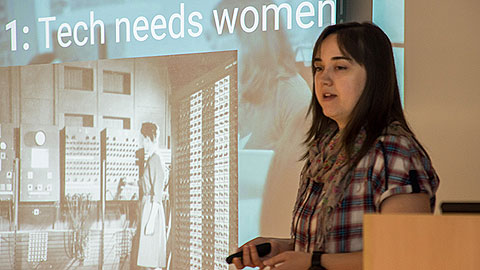“In computing the only limits to creativity are in our own imagination”

08/10/2015
Vanessa has a master's degree in Computer Engineering from Universitat Rovira i Virgili, is 33 years old, and loves talking about what she does, so as to meet other professionals in her field and get more women interested in computer engineering. As well as working in a consultancy firm, setting up her own mobile apps business and belonging to the Tarragona Google Developer Group (GDG), she has also organised the first Women Techmakers in Spain and the two editions of this held in Catalonia. And together with other women technologists she has started Tech& Ladies.
Why have you started this association?
I and several other women in the Spain GDG decided to create it last year, to increase the presence and visibility of women computer engineers, set up networks, get technical training and explain properly what we do in our profession, which is an exciting one. It's been just over a year now and there are more and more of us: close on fifty now.
What's the best way to get more women interested in computer engineering?
The name itself might be a handicap, because I'm told more women used to take it before, when the degree was in Computer Science. No, but seriously, I think it's a question of spreading the word better. Not enough is done at school level to promote it. And that means more than just telling pupils they'll have to study algebra or systems analysis.
What's the best way to do it?
Telling them what they'll be able to make if they study computer engineering, and show them examples. We need more practical workshops and exciting experiments to attract both girls and boys. Not long ago we ran a hackathon for boys and girls between the ages of 7 and 14 to make a simple video-game. And there were almost more girls than boys. They had a great time. And that kind of thing changes social attitudes, and parents's attitudes.
Did your own parents influence your choice of degree?
Not directly but even when I was little I used to play around with computers, like a Commodore my father had, and then later on they bought me a Spectrum. If you give children toys that make them think, create or build things, not just ones that are specifically for boys or for girls, when they grow up they won't see engineering as something strange and not related to them.
So you have always been sure about what you wanted to do?
No, when I had to make a choice the fashionable degrees were Architecture and Telecommunications, but I didn't go for them. I ended up in Computer Engineering without having much idea about what I was faced with, though I had always been good at technology. I like it more and more as the years go by, because I can see the possibilities it opens up.
Would a TV series help to promote it?
Definitely. CSI got people interested in criminology and Grey's Anatomy did the same for medicine. But they'd better not portray computer engineers as freaks, which some series do nowadays. That just makes people back away.
Do you have a female role model?
Not really. I do admire Ada Lovelace, a 19th century technologist and mathematician, who is regarded as the first ever woman computer programmer. She was the daughter of Lord Byron. And she was a poet too. Can you imagine a woman computer expert in the first half of the 19th century?
Do you support positive discrimination in your sector?
If it means competing on equal terms regarding knowledge and aptitudes, yes. Companies are starting to realise they need women in their development teams, and that the solutions they offer have to meet the needs of the whole of society, men and women. With teams that are more egalitarian, better balanced and more complete, end results just have to be better too.
Have you ever been upset by male colleagues' attitudes or remarks?
No, I really haven't. At work I've always been treated as an equal. But the outside world can be very different. Sometimes people in a conference assume you're the partner of one of the speakers, or you can be talking to a politician or a businessman and they look at your male colleague instead of you. That kind of thing has to change.
What would you say to encourage girls to study computer engineering?
1.- I'd say don't be scared by the subjects and look beyond them, because it's tremendously satisfying to do things that meet real needs in the real world.
2.- Technology is moving forward at a dizzying rate and there are studies that predict a huge demand for computer engineers in a few years.
3.- With so much hardware and software at our disposal, the only thing that can stop us from creating new products and services is our own imagination.